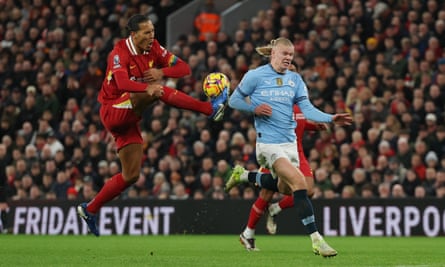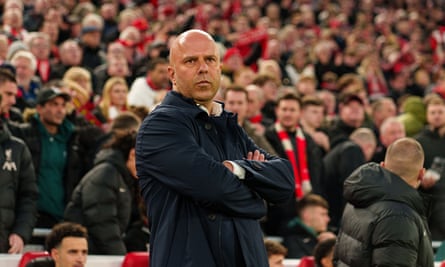Like crocuses pushing up through the soil, like a first glimpse of daffodil in spring, you know something’s up at West Ham, and indeed Everton, when David Moyes starts turning up on Match of the Day Two like a hopeful uncle at a funeral, looking trim and urgent and chiselled, with perhaps even a slight shade of spray-salon, a touch of Ibiza Whisper.
Moyes did a thorough video debrief for the BBC of Virgil van Dijk’s defending against Erling Haaland at Anfield. This wasn’t the toughest analysis given it basically involved showing Van Dijk gliding about taking the ball away, doing Dad-defender stuff – Erling, we’ve talked about this, you’ll have to wait for Crystal Palace – and generally defanging an elite striker he just seems to have the cheat code to every time.
It was a significant choice of headline act in other ways. There is a parallel track to Liverpool’s progress right now. On one side, the Arne Slot rebuild. On the other, the Doomsday Clock countdown around contracts and retention of key parts of the succession; Van Dijk, Mohamed Salah and Trent Alexander-Arnold.
If Van Dijk’s performance had wider significance, it lies in the fact he is surely the easiest and most cost-effective to make an exception for. Here is a 33-year-old who is the defensive armature of this team and its spirit animal through all the recent good times. How do you replace this? Answer: you don’t. Better to just put it off right up until the day you have no choice.
Moyes didn’t have time to present the best part of the Haaland-Van Dijk super-cut, the interception midway through the second half where Haaland seemed to have found a hole, spinning off Joe Gomez and haring in behind the Liverpool backline. At which point Haaland’s line of vision was interrupted by that familiar figure in red, reaching a leg up to pull the ball out of the air, the kind of pre-defending that isn’t function of speed or athleticism but of being so plugged into the game that every detail seems to happen only in draft form, all of it pending Van Dijk approval.
Van Dijk and Haaland are easy threads to pick out of Sunday’s game. In part because one was sensationally, minimally good, the other sensationally, minimally absent. But also because both capture in their own ways the arc of these two teams right now.

Van Dijk’s game was elite on the basic numbers. He completed 38 of 40 passes, made a total of 13 tackles, interceptions and clearances, and had four attempts at goal. Even the one big mistake, dawdling on the ball then seeing Caoimhín Kelleher make a really smart save from Kevin De Bruyne, turned into a good moment as Van Dijk got to be great about it, pointing in a check-this-dude way toward his goalkeeper, an error repurposed as great guy content.
More to the point, Van Dijk’s performance was entirely in keeping with his season so far. This is the other thing about Liverpool’s progress under Slot, the obvious improvement of individuals, including mature Klopp-engineered parts. Van Dijk has been quietly sensational, a footballer re-peaking, striding about the place like the 17th Earl of Egham with a quiver of pheasants over one shoulder.
He has the most passes of any player in the Premier League so far this season, although this is as much a reflection of Slot’s influence, the added air in the system, time for the players to breathe in between the surges. Otherwise the numbers state very clearly how Van Dijk plays the game at his best. He is equal second in the league for interceptions alongside Kenny Tete and Mario Lemina but in a team that always has the ball. This is someone who really is very good at interceptions.
Most telling, Van Dijk has also attempted only 11 tackles all season (158th in Europe’s top five leagues, fewer than Marcus Rashford). Tackles are weakness. Van Dijk doesn’t tackle. He politely intervenes. Even more startling, he has committed only seven fouls – total, period, that’s it – all season and picked up one yellow card. These are sensational non-numbers, fiercely assertive passivity. This is a footballer who is literally taking the football out of every opponent he faces.
after newsletter promotion
It is here that Haaland feels like the appropriate point of contrast, and in a way that has never been more apparent than at Anfield. At what point does a Pep Guardiola team look so little like a Pep Guardiola team that it stops being a Pep Guardiola team? We are the hollow men, we are the stuffed men. This was at times a little unnerving.
Somehow City have attracted 130-odd charges of allegedly juking the stats in order to build a squad – all of which they deny – and still ended up with a team this thin, this divorced from its own tactical identity. They had no wingers here, until finally they had wingers, but worse wingers than they used to have. Guardiola loves wingers.
City are missing Rodri, but they also lack any kind of high-class functioning midfield. Guardiola loves midfielders. How has he managed to lose this City one so completely, fishing down the back of the sofa and coming up with an old comb, some fluff and Matheus Nunes? No ball players, no overloads, no extreme qualities. Even Guardiola looked disinterested on the touchline, uninvolved in his own creation.
Perhaps it comes back to Haaland. There was always a slight deal with the devil dynamic about bolting the super predator to the front of the brilliant team that would go on win the treble. This was an act of arch pragmatism, a one-season build. We are good enough, right now, to keep the ball forever anyway, to create endless chances, to make everyone else run. Why not just strap a bayonet on to the front of this thing.

The problem, so evident at Anfield, is the decay in the architecture of the rest of the team. City had just one extreme area of excellence at Anfield. This was Haaland, the poacher who demands a dominant high-end team at his back to have any impact at all at this level.
Here he had 16 touches, no headers and one shot on target. Don’t judge him by his touches, that’s not his game! Well, it’s everyone else’s game in this team. When one player is making six passes in a team that expects to make 500, it puts an unavoidable strain on every other part. Which is fine when those parts are Rodri and De Bruyne, but a serious burden for the 20-year-old Rico Lewis. Van Dijk understood the assignment, blunted that lone razor edge. At which point City had no weapons left.
In contrast to this, Liverpool played a kind of roving tactical medley at Anfield: high-press, counterattack, deep defence, spells of possession. This has been key to Slot’s success so far, avoiding the temptation to effect an ego-driven rebuild, instead trimming and dressing and adding his own layers.
They have now beaten City and Real Madrid in the space of four days with no goals conceded. The season is still young. Six of Liverpool’s next nine league games are away from home. Contract shenanigans are likely to intrude as January approaches. But part of this team’s strength is that it is still essentially Klopp’s machine, still deeply grooved around those players. The evidence of Anfield, and indeed of the season so far, is that Van Dijk remains the keystone.

.png) 1 month ago
14
1 month ago
14













































